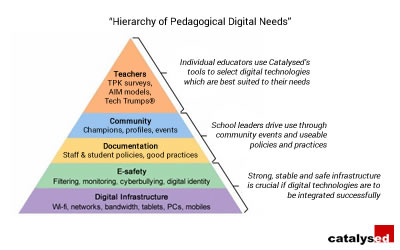Analyse
The Analyse module helps a school understand their current level of digital readiness in order to ensure that there are no barriers to effective technology integration.
What are the benefits?
The Analyse module is a diagnosis of where a particular school stands in terms of their use of digital technologies to enhance teaching and learning. This combines a practical assessment of physical ICT, the use of surveys to ascertain the level of digital literacy of staff, and an analysis of existing policies and practices and how these support the use of ICT. Completing this module will produce for you a detailed report on your schools digital readiness, allowing you to make an informed choice for developing your digital infrastructure.
Why choose it?
Making digital technologies work effectively for you in education is not a trivial matter. Although research has shown that teachers are keen to make the most of digital technologies in the classroom, they often encounter too many barriers, such as lack of support from senior management, lack of access to resources, or poor infrastructure.
"Teachers have a strong desire for the integration of ICT into education but they encountered many barriers to it."
Bingimlas, 2009
Typical problems include outdated or ineffective hardware, confusing and conflicting policies and practices, or disengaged and technophobic staff. Catalysed is aware of the many potential pitfalls, and has multiple tools which is can bring to bear in order to surface these issues, and hence deal with them effectively.
 How does it work?
How does it work?
Catalysed has developed a "Hierarchy of Pedagogical Digital Needs", which is based on extensive educational research, to identify potential barriers to effective use of digital technologies. This hierarchy ensures that foundational needs such as reliable wifi and e-safety are met before attempting to move to more complex and powerful use of technologies to enhance learning.
The hierarchy has been translated into a Survey of Pedagogical Digital Needs that can be used either independently by a school, or in partnership with Catalysed, in order to surface barriers at multiple levels of the hierarchy.
The Hierarchy of Pedagogical Digital Needs is designed to surface school wide issues, but it cannot help identify individual attitudes - and there is strong evidence to suggest individual attitudes are the hinge point upon which effective use of digital technologies rests. To address this problem Catalysed uses the TeLRA, or Test of e-Learning Related Attitudes (TeLRA) survey. Another product of academic research in this field, the TeLRA can reveal individual attitudes to e-learning against four themes, helping to identify areas of strength and challenge, and suggesting different paths for action depending on the results.
I'd like more information about the Analyse module
